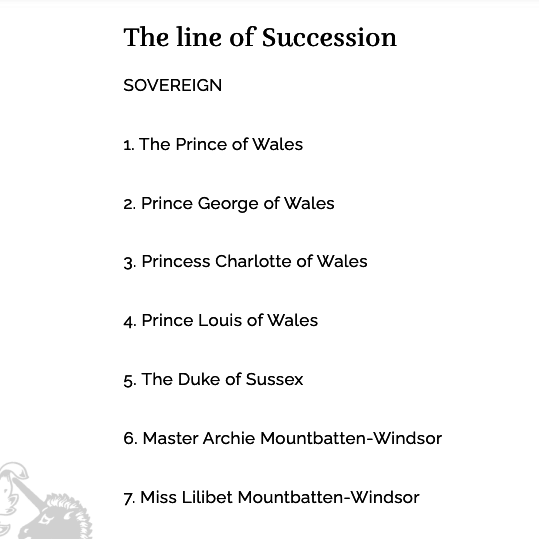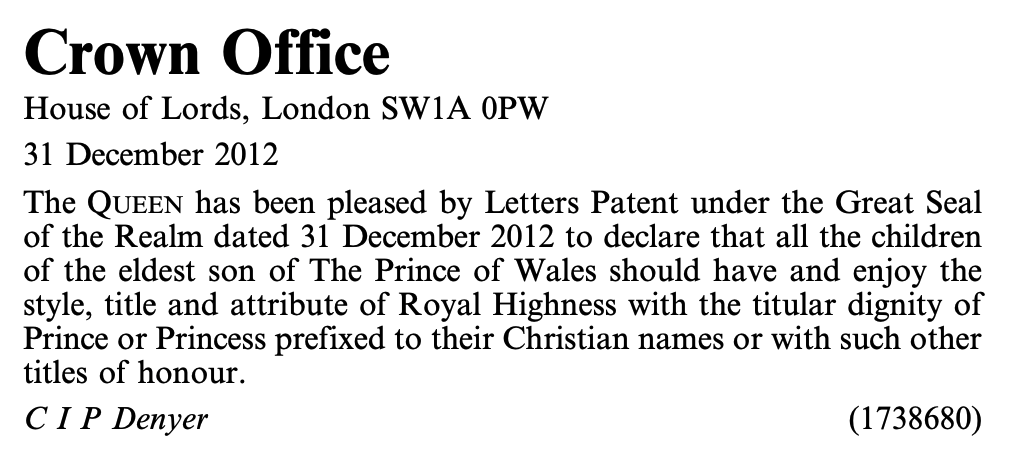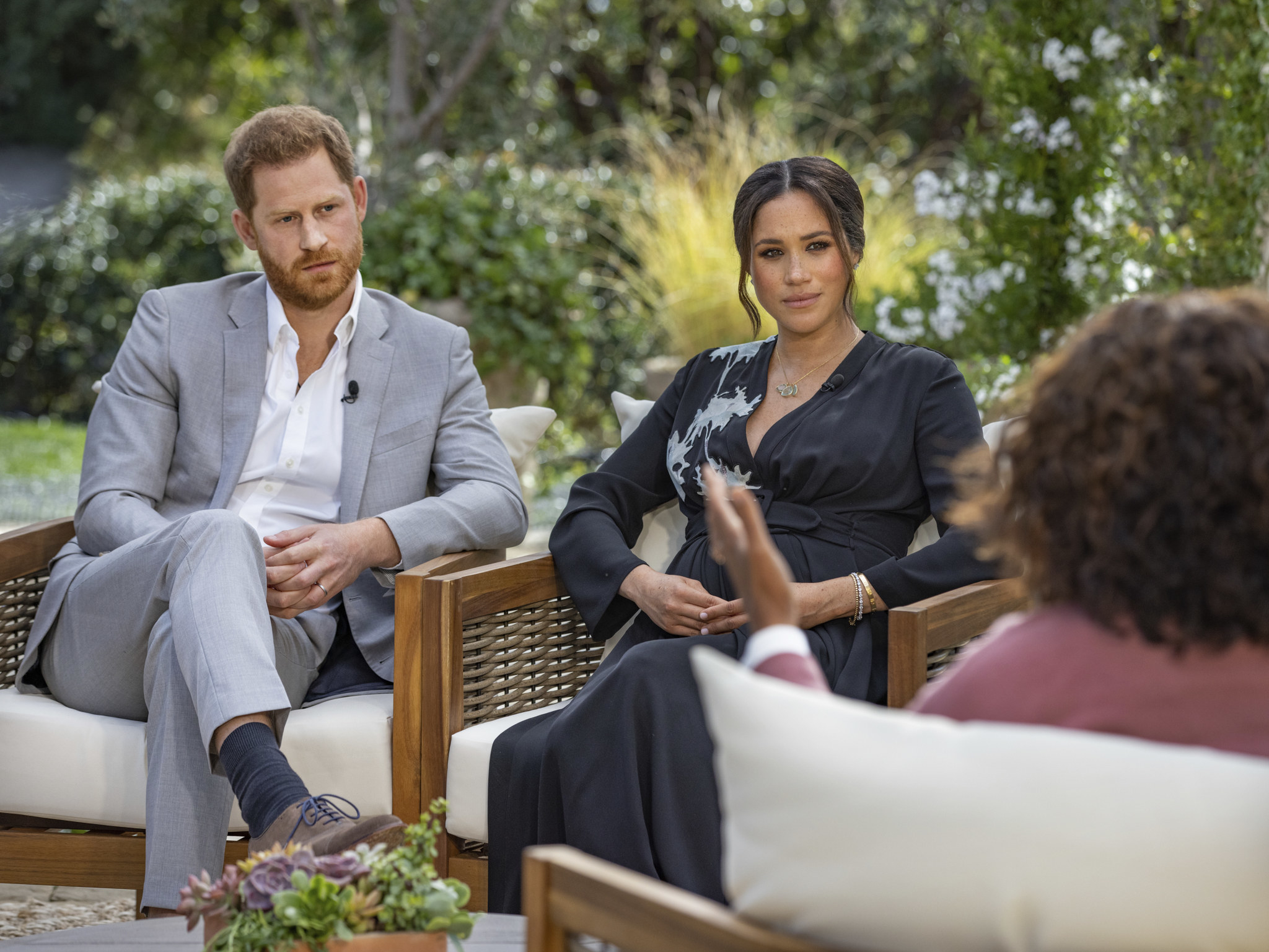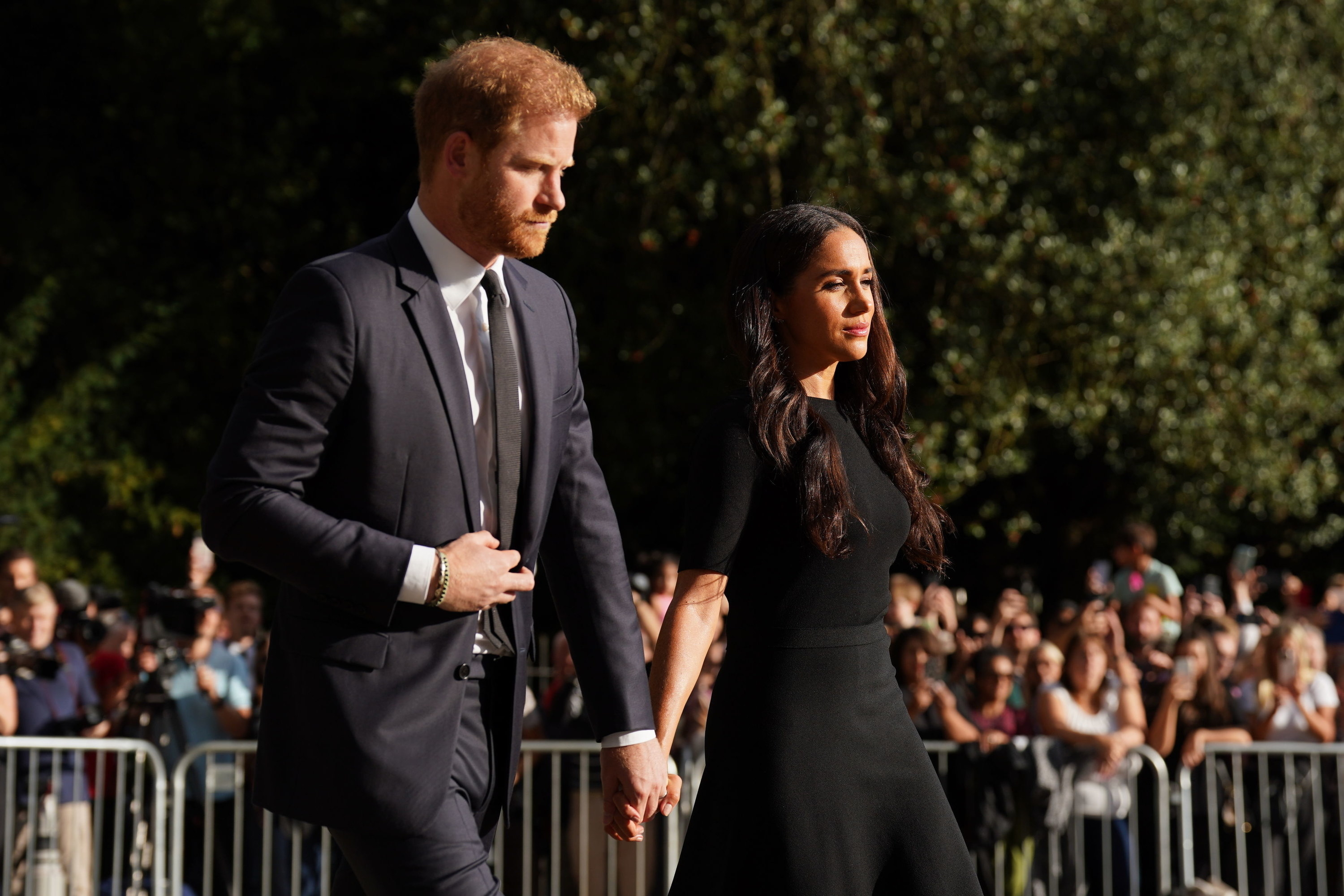We’re more than two weeks into the reign of King Charles III and there’s still no answer to one seemingly simple question: Will his grandchildren, Archie Harrison and Lilibet Diana Mountbatten-Windsor, become a prince and princess, to be addressed as “their royal highnesses,” or won’t they?
Buckingham Palace has said multiple times that it won’t be addressing that question until after the official mourning period for Queen Elizabeth II ends on Sept. 26 — although in press briefings, the royal spokespersons have given some eyebrow-raising quotes when asked about when the decision about titles will be made, in one instance replying “the future is an amazing thing,” as reported by the Daily Mail.
According to guidelines laid down by King George V in 1917, grandchildren of the sovereign in the male line (aka, the children of one of the king’s sons, like Archie and Lilibet) become “royal highnesses” and princes or princesses upon the accession of a new sovereign to the throne.
However, it’s not necessarily an automatic thing.
Past monarchs, including the late Queen, have deviated from or straight-up disregarded George V’s rules — sometimes using a royal order known as a “letters patent,” and in some instances just making an announcement that members of the royal family would be using a different set of titles than the ones they technically were supposed to have. (We’ll go into this in detail in a little bit, but this is what Queen Elizabeth II did to modify the titles of her youngest son’s children.)
Part of the issue, of course, is that Archie and Lilibet are in a position unlike any faced by royal grandchildren in the past: Their parents, Prince Harry, Duke of Sussex, and Meghan, Duchess of Sussex, made the unprecedented decision to step back from life as working members of the royal family in January 2020.
One of the things that Harry and Meghan gave up as part of that deal was the use of their own “royal highnesses” titles — honorifics their children would be granted if they became prince and princess of Sussex.
Ground zero for Titlegate 2022 is the page on the royal family’s official website listing the order of succession to the throne. Within hours of the announcement of the Queen’s death, the official royal succession page had been updated to reflect the new monarch. However, Harry and Meghan’s children were still listed as Master and Miss Mountbatten-Windsor, not Prince Archie and Princess Lilibet of Sussex.

The delay in announcing the Sussex children’s titles is in sharp contrast to the swiftly publicized changes for the King’s other son and his family in the wake of Queen Elizabeth II’s death.
In a speech delivered on Sept. 9 just shy of 24 hours after the announcement of the Queen’s death, the new King gave his other son and daughter-in-law, the royals best known as Prince William and Kate Middleton, the titles of Prince and Princess of Wales. Within hours of the King’s speech, the page on the royal family’s official website listing the line of succession was updated with the new Wales titles for William, George, Charlotte, and Louis. (The children were previously Princes and Princess of Cambridge; they’re now Princes and Princess of Wales.) But Archie and Lilibet were — and, as of press time, remain — “Mountbatten-Windsors.”
If Buckingham Palace is to be believed, those quick website updates for William and his kids were a fluke, a one-off.
When asked about why Archie and Lilibet’s titles hadn’t been updated on the royal family’s official website during press briefings, the King’s spokespersons somewhat evasively replied that they were waiting for further information from an unspecified party. “We will be updating the website as and when we get information,” one spokesperson said, as reported by the Sunday Times. The Press Association even titled its Sept. 10 story “Palace waits for information on Archie and Lili’s titles before website change,” as if it is a decision to be made by an outside force.
Without question, the best official response to a media query about the Sussex children’s titles and the royal family’s official website was made by a spokesperson who referenced King Charles III’s inaugural speech, in which the King said, “I want also to express my love for Harry and Meghan as they continue to build their lives overseas.”
“While the website was updated for the Waleses, clearly updating love on a website doesn’t quite work so we’ve not quite done that but clearly he does love [the Sussex children],” the spokesperson said, as reported by Hello magazine on Sept. 10.
Another spokesperson for the King confirmed the accuracy of the quotes above via email and said that “the focus now is on mourning the Queen, and [the issue of Archie and Lilibet’s titles] is something for further down the line.” The spokesperson declined to provide further specifics on how long that line might be.
And so the Sussex children find themselves in a state of royal limbo. They — and the world — won’t know if they’re a prince and princess until their grandfather makes up his mind.
King Charles III is the sole decider of his grandchildren’s status, and there are historical precedents for granting and denying the titles of prince and princess to Archie and Lilibet.
In 1917, King George V issued a letters patent stating that the HRH/prince/princess titles were to be limited to children of the monarch, grandchildren of the monarch in the male line, and the eldest son of the second in line to the throne (so only the great-grandson who would one day be king). Subsequent sovereigns have made exceptions to this rule in order to grant titles to royal children who wouldn’t otherwise qualify. An example of this is a letters patent issued by King George VI in 1948 that made the children of Princess Elizabeth and Prince Philip, Duke of Edinburgh, princes and princesses and “royal highnesses.” As royal historian Marlene Koenig notes on her website, despite the fact that Elizabeth was the heir to the throne, without the letters patent the two children born during her father’s reign would have been styled as the children of a duke (specifically, Charles, Earl of Merioneth, and Lady Anne Mountbatten).
Here’s where it gets more complicated: Despite what you may have read, a letters patent isn’t required in order to deny HRH/prince/princess titles to people who qualify for them under George V’s rules. In fact, the royal family has recently deviated from George V’s framework without issuing a letters patent — specifically regarding the children of the Queen’s youngest son, Prince Edward, Earl of Wessex.
On Edward’s wedding day, the Queen announced that his children would not be HRHs/princes/princesses, and would instead be styled as children of an earl. And so they were — Lady Louise Windsor and James, Viscount Severn, are the titles used by Edward’s children. According to George V’s rules, Louise and James qualified for HRH/prince/princess titles, but the Queen decided against it before they were even born. At the time of the wedding, a royal spokesperson said that the decision about titles was “the clear personal wish of Prince Edward and [bride] Miss [Sophie] Rhys-Jones as being appropriate to the likely future circumstances of their children."
“You have a precedent for the grandchildren [of the monarch] in the male line not being styled as HRH,” Koenig told BuzzFeed News. “Let me stress that word: precedent. People always forget Edward and Sophie’s children.”
But why, you may ask, are William and Kate’s children all HRHs and princes and a princess, when George V said that only the eldest male great-grandchild who would one day become king qualified? Because the Queen decided to change the rules for them — and this time, she did use a letters patent. It was issued on Dec. 31, 2012.

As the grandchild of the monarch in the male line, William has been a prince since birth. But, under George V’s rules, only William’s eldest son (aka the male heir to the throne) would be a prince and an HRH — his other children would be styled as the children of a duke. The Queen changed this in a letters patent that explicitly stated “all the children of the eldest son of the Prince of Wales” would be royal princes and princesses. Part of the reason for this change was the imminent passage of the Succession to the Crown Act 2013, which eliminated male-preference primogeniture. Therefore, if William and Kate’s first child were a girl — and, thanks to the act, heir to the throne — it wouldn’t be a great look for the future queen to be styled as the child of a duke and not a princess. (Because at the time, they were officially William and Catherine, Duke and Duchess of Cambridge, it’s only after the Queen’s death that he’s returned to prince status.)
You can’t help but wonder if Archie and Lilibet would be in this current state of title limbo if the Queen hadn’t issued that letters patent back in 2012. Would there have been this sort of a delay in an official confirmation (or denial) of royal titles if the Sussex children and Charlotte and Louis were all eligible for a title upgrade upon King Charles III’s accession to the throne?
Who knows.
What we do know is that the Queen by word (the letters patent granting royal titles to William’s children) and deed (not allowing Edward’s children to be HRHs/princes/princesses) deviated from George V’s rules — and the new monarch can simply say he was following her lead if he decides against giving his grandchildren titles.
And he can do it however he wishes, whether by letters patent, official announcement, or even just an update to the royal family’s website.

A key part of the intense public and media interest in whether Archie and Lilibet will receive royal titles is due to Meghan’s allegations in her March 2021 interview with Oprah Winfrey that the royal family did not want her and Harry’s children to be princes and princesses.
“There’s a convention — I forget if it was George V or George VI convention — but when you’re the grandchild of the monarch, so when Harry’s dad becomes king, automatically Archie and our next baby would become prince or princess, or whatever they were going to be,” she told Oprah. “While I was pregnant, they said they wanted to change the convention for Archie.”
You can see why people are resurfacing that quote in light of the Palace’s delay in announcing whether Harry and Meghan’s children will have prince or princess titles. Especially given the fact that Meghan explicitly expressed her concern about “the idea of the first member of color in this family not being titled in the same way that other grandchildren would be.”
There is, however, one big problem when it comes to the interview: Meghan’s other remarks to Oprah reveal a fundamental misunderstanding of the historic 1917 letters patent. Meghan said that she and Harry were explicitly told by the royal family that their child wouldn’t be a prince from birth, which she said “would be different from protocol.”
Except that it wasn’t. Making their child a prince would have been without precedent and outside the guidelines established by George V. The only reason why William and Kate’s children were all princes and princesses was that the Queen had issued a letters patent. Were Harry and Meghan at the time expecting a similar letters patent for their children?
BuzzFeed News has reached out to the Sussexes for clarification.
However, Meghan’s apparent confusion about how royal titles work will mean nothing if the Palace denies Archie and Lilibet the status of HRH/prince/princess — because of how she addressed the issue in the Oprah interview:
“You certainly must have had some conversations with Harry about it and have your own suspicions as to why they didn’t want to make Archie a prince,” Oprah asked. “What are those thoughts? Why do you think that is? Do you think it’s because of his race? ... And I know that’s a loaded question but —”
“But I can give you an honest answer,” Meghan said. “In those months when I was pregnant, all around this same time ... so we have in tandem the conversation of ‘He won’t be given security, he’s not going to be given a title’ and also concerns and conversations about how dark his skin might be when he’s born.”
That’s it. In the face of that quote, arguments about historical precedent won’t matter to a large percentage of the public. Nor will the fact that, when asked about that conversation by Oprah, Harry said that the remark had been made by one of his family members “right at the beginning” of his and Meghan’s relationship, not during her pregnancy.
If the titles are denied to Archie and Lilibet, all that will matter to a large part of the population is the fact that Meghan saw this coming.

What do Harry and Meghan really want? It’s hard to know. The Sussex press team declined to go on the record when I asked them, and the couple have made contradictory statements in the past.
When Archie was born, the couple’s spokesperson said that the new parents had chosen for their son not to take the courtesy title he was owed as the child of a duke (he would have been Archie, Earl of Dumbarton) in order to give him as normal a life as possible.
But Meghan repeatedly told Oprah that she and Harry were not given a choice about their first child’s title — although she explicitly said Archie was denied a princely title. “You know, we had heard — the world, those of us out here reading the things or hearing the things — that it was you and Harry who didn’t want Archie to have a prince title. So, you’re telling me that is not true?” Oprah asked. “No, and it’s not our decision to make, right?” Meghan replied.
Meghan also told Oprah that her son having a title was only important to her “if it meant that he was going to be safe,” but said that the choice about having a title shouldn’t be taken away from her children. “I have a lot of clarity on what comes with the titles, good and bad — and from my experience, a lot of pain,” she said. “Again, I wouldn’t wish pain on my child, but that is their birthright to then make a choice about.”
One thing is for sure — since Harry and Meghan are now autonomous from the royal family, this time at least, we’ll likely know exactly how they feel about whatever decision is made.
Possible outcomes for Titlegate 2022 have been the subject of media speculation since the Palace declined to update the Sussex children’s titles on the royal family’s official website. The Sun reported that King Charles III planned to give Archie and Lilibet the titles of prince and princess but deny them the honorific “royal highness” styling. The tabloid and multiple news outlets have reported behind-the-scenes arguments between the King and the Sussexes, with Harry and Meghan described as “relentless since the Queen’s death” and “furious” over their children being denied HRH status.
And then, on Tuesday, Vanity Fair royal reporter Katie Nicholl wrote that the King hasn’t made a decision and will make the call about Archie and Lilibet’s titles based on their parents’ behavior. Nicholl quoted a “source close to the King'' as saying “it depends a lot on what happens in the coming months,” specifically with Harry’s announced memoirs, likely to be published before the end of the year, and the Netflix TV show Meghan hinted at in her recent profile on the Cut.
We’ll soon see who was right — if anyone was right at all. When it comes to the Sussexes, anything is possible and everything is controversial. And that’s part of the dilemma King Charles III is now facing. His desire to create a “slimmed-down” monarchy is well known; indeed, limiting the number of royals has been a priority for the House of Windsor since the “Way Ahead group” of the 1990s. A prince and princess who will never be working members of the royal family and live in the US doesn’t exactly align with that vision. (And yet, it's also true that even in the cause of “slimming down” the monarchy, it seems unlikely that the new King will strip his nieces — who are not working members of the royal family — of their titles as HRHs Princess Beatrice and Eugenie of York.)
How much would it hurt the King’s public image and brand-new reign to deny those titles to the children of the son of the much-loved Princess Diana and a mixed-race woman, especially in the countries poised to leave the Commonwealth now that Queen Elizabeth II is gone? How will his subjects react to having one set of grandchildren be princes and a princess and the other treated so differently? Not to mention the toll that his decision will have on his personal relationship with Harry and his family.
This is arguably the first big decision of King Charles III’s reign. You can’t really blame him for waiting until the last possible moment to make it.
